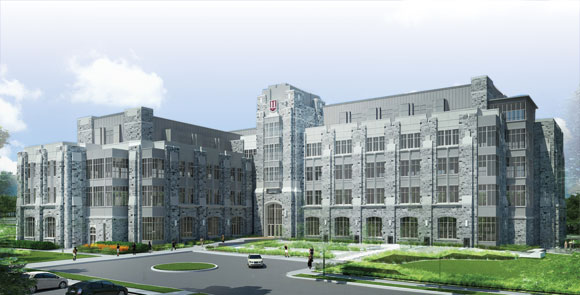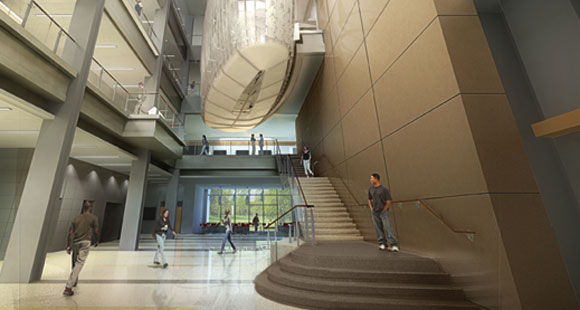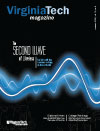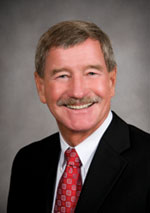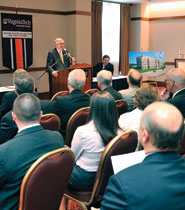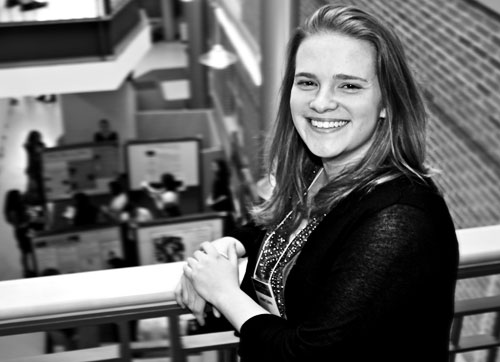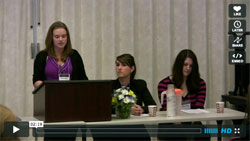 |
|
||||||
|
|
||||||||||||||||||||||||||||||||||||||||||||||||||||||||||||||||||||||||||||||||||||||||||||||||||||||||||||||||||||||||||||
|
Virginia Tech receives record gifts This spring, the university announced the largest single donation in its history and its largest bequest ever realized. The two gifts, both directed to the College of Engineering, totaled more than $42 million. Virginia Tech President Charles W. Steger announced them, as well as a separate $3 million commitment of support for engineering, at an April press conference.
On an extraordinary day for the university, Steger disclosed that an anonymous donor had committed $25 million toward the Signature Engineering Building. "The monetary value of such a gift is tremendous, but equally important is that a gesture of this magnitude is certain to inspire all who support our programs and those who will reap the benefits of the world-class education that our College of Engineering provides,” he said. Steger also announced $3 million for the project from the Quillen family of Southwest Virginia, and receipt of more than $17 million from the estate of Robert E. Hord Jr., of Richmond, Va., who died in December 2010. Hord (mechanical engineering '49, M.S. power and fuel engineering '50) directed his gift to the mechanical and chemical engineering departments, both of which will have space in the Signature Engineering Building. The Quillens' support was led by alumnus Michael J. Quillen (civil engineering '71, M.S. '72), of Bristol, Va. Considered the top priority in Virginia Tech's capital construction plan, the Signature Engineering Building is expected to draw $50 million in state support and $50 million in private donations for its construction. The current plan is for a four-story, 153,000-square-foot building near the corner of Prices Fork Road and Stanger Street. College of Engineering Dean Richard Benson said the new building is essential to address growing enrollment demand, particularly at the undergraduate level. He said the college would like to admit more students but needs better and bigger facilities. Many companies rely on Virginia Tech for engineering talent and so support the proposed project as way of ensuring a highly qualified workforce in the commonwealth, said John Sparks (mechanical engineering '74, M.S. '76, Ph.D. '81). Sparks appeared with Steger and Benson at the gift announcement. He has lobbied for state support of the Signature Engineering Building and is a director at Aerojet, a major space and defense contractor with two locations in Virginia. "We in industry need a large supply of bright, creative, hit-the-ground-running engineers, the type we get from Virginia Tech," Sparks said.
Albert Raboteau is a writer for University Development. |
|
|||||||||||||||||||||||||||||||||||||||||||||||||||||||||||||||||||||||||||||||||||||||||||||||||||||||||||||||||||||||||||
| - - - - - - - - - - - - - - - - - - - - - - - - - - - - - - - - - - - - - - - - - | ||||||||||||||||||||||||||||||||||||||||||||||||||||||||||||||||||||||||||||||||||||||||||||||||||||||||||||||||||||||||||||
|
Giving voice to student discoveries
For Virginia Tech's Department of English, the best day of the year is the day of the Undergraduate Research Conference.
This year, more than 45 students from across the university shared their research with an audience of faculty, parents, English department alumni, and fellow students. The presentations covered a variety of subjects from Charles Dickens to Robert Frost, African-American literature to popular culture, document design to poetry. Research, often understood to be a solitary endeavor, finds its fullest expression when discoveries are shared with others and opened up for discussion and collaboration. Accordingly, research conferences such as this one help undergraduate students discover and develop their voices. One participant, Jessie Cohen, came to Virginia Tech with plans to major in biology. She made the jump to English in her sophomore year, however, when she realized she spent more time reading the work of Nobel Prize-winning writer Derek Walcott than her biology textbooks.
In May, Cohen traveled to Miami to present her paper about the implications of female sexual expression and repression in "The Bluest Eye" and "Sula," both by Toni Morrison, at the ACC Meeting of the Minds. The annual conference allows undergraduate students in the Atlantic Coast Conference to highlight research excellence and to share their work with peers. Donations from friends and department alumni help make opportunities such as these possible. The department uses gifts to produce the Undergraduate Research Conference, as well as to help students travel to national conferences. It's easy to assume that only endowments and scholarship funds matter. But modest gifts can make a real difference to students who are able to expand their academic horizons because of such generosity. "Without such funding, opportunities for students to present their research would be in short supply," said Rachel Holloway, the conference's keynote speaker and associate dean of undergraduate academic affairs in the College of Liberal Arts and Human Sciences. "It is these kinds of opportunities that help make the Virginia Tech experience truly special." • For more information, visit www.givingto.vt.edu.
|
||||||||||||||||||||||||||||||||||||||||||||||||||||||||||||||||||||||||||||||||||||||||||||||||||||||||||||||||||||||||||||
|
|

